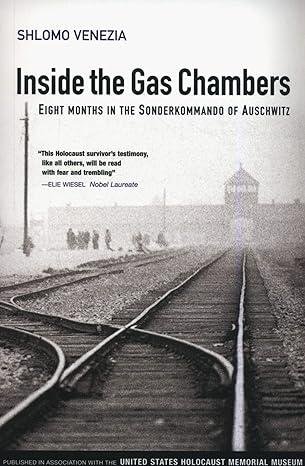Inside the Gas Chambers: Shlomo Venezia's Harrowing Account
The Holocaust remains one of the darkest periods in human history, a time when millions of Jews and other minorities were systematically exterminated by the Nazi regime. Among the survivors who lived to tell their stories is Shlomo Venezia, a Greek Jew who was deported to Auschwitz-Birkenau in 1944. His memoir, "Inside the Gas Chambers: Eight Months in the Sonderkommando," provides a chilling and detailed account of his harrowing experiences. Now available in EPUB format, this book offers an accessible and powerful testament to the horrors of the Holocaust.
A Survivor's Tale
Shlomo Venezia was born in Thessaloniki, Greece, in 1923. His early life was relatively normal, but everything changed when the Nazis occupied Greece in 1941. In March 1944, Venezia and his family were deported to Auschwitz-Birkenau. Upon arrival, he was separated from his family and assigned to the Sonderkommando, a group of prisoners forced to work in the gas chambers and crematoria.
The Sonderkommando
The Sonderkommando were tasked with some of the most horrific duties imaginable. They were forced to escort prisoners to the gas chambers, remove bodies, and dispose of them in the crematoria. This role was imposed upon them under the threat of death, and the members of the Sonderkommando lived with the constant knowledge that they too would eventually be killed to eliminate witnesses to the atrocities.
Shlomo Venezia's Experiences
In "Inside the Gas Chambers," Venezia recounts his time in the Sonderkommando with a stark and unflinching honesty. He describes the psychological and emotional toll of his duties, the daily struggle for survival, and the fleeting moments of humanity amidst the overwhelming brutality. Venezia's memoir is not just a recounting of events but also an exploration of the moral and ethical dilemmas faced by those in the Sonderkommando.
The Importance of Witnessing
One of the most significant aspects of Venezia's memoir is its role as a witness to history. The Holocaust is an event that demands remembrance, and firsthand accounts like Venezia's are crucial for ensuring that the world never forgets. His detailed descriptions of the operations within the gas chambers provide a valuable historical record and serve as a powerful reminder of the consequences of hatred and intolerance.
Themes and Reflections
Venezia's memoir touches on several profound themes, including the resilience of the human spirit, the capacity for cruelty, and the importance of memory. He reflects on the ways in which the Holocaust has shaped his life and identity, as well as the broader implications for humanity. His insights offer readers a chance to grapple with difficult questions about morality, survival, and the nature of evil.
Legacy and Impact
Since its publication, "Inside the Gas Chambers" has had a significant impact on readers and scholars alike. It has been translated into multiple languages and is frequently cited in studies of the Holocaust. Venezia's account has also inspired numerous discussions about the experiences of the Sonderkommando and the ethical complexities of their role.
"Inside the Gas Chambers: Eight Months in the Sonderkommando" by Shlomo Venezia is a powerful and essential read for anyone seeking to understand the depths of human cruelty and the strength required to survive it. The availability of this memoir in EPUB format ensures that Venezia's voice continues to be heard, offering a poignant reminder of the importance of bearing witness to history. Through his detailed and honest recounting, Venezia provides not only a historical document but also a profound reflection on the nature of humanity.
As we continue to confront issues of intolerance and hatred in the modern world, Venezia's memoir stands as a testament to the need for remembrance and education. His experiences serve as a stark warning of the dangers of unchecked prejudice and the importance of standing against injustice. "Inside the Gas Chambers" is not just a book; it is a vital piece of our collective memory, ensuring that the horrors of the past are never forgotten and that we remain vigilant in the face of such atrocities.
